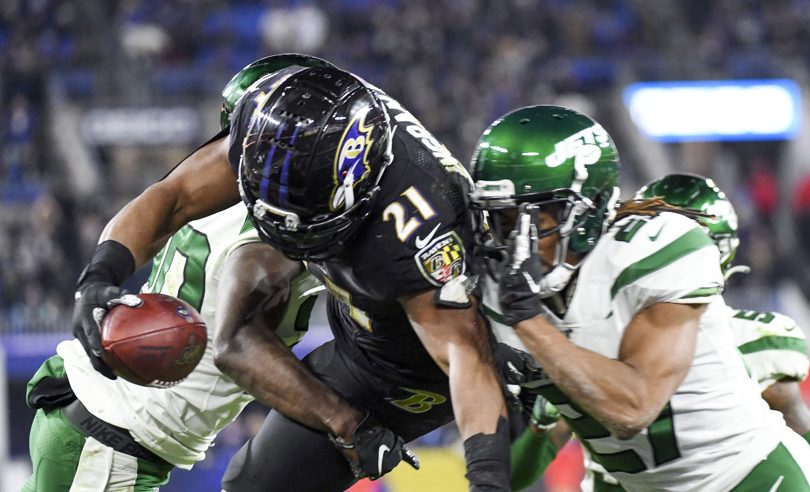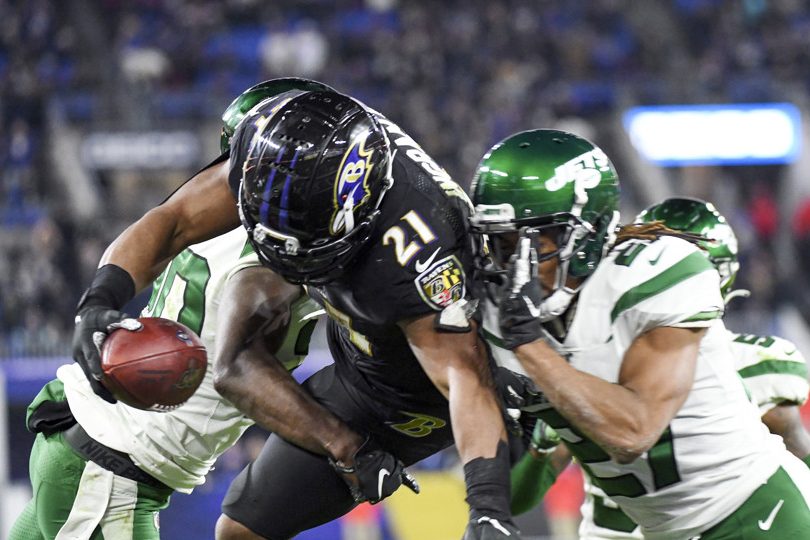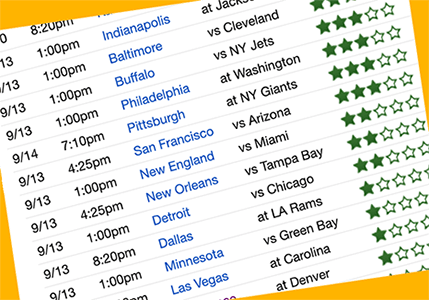Will Sloppy Defense Lead To Lots Of Overs In 2020 NFL Week 1?
September 12, 2020 – by Jason Lisk

The Ravens scored a ton of points in 2019, will the rest of the league get off to a hot start due to the weird offseason? (Photo by Mark Goldman/Icon Sportswire)
We saw these tweets a few days ago about the potential impact of the having no preseason games and limited preparation due to the coronavirus:
Talked abt this for weeks & have cited 2011 week 1. 72% of overs hit weeks 1-2. Also special tms & tackling should be sloppy. In that week 1 2011 set of gms, there were 8 Punt/KO return TDs. All other yrs the avg has been 1.6. No other wk 1 has had >4 https://t.co/cNDRj8m71U https://t.co/m4TqU3EuE7
— TA (@ClevTA) September 9, 2020
They got us thinking. The big challenge of trying to predict how this abnormal 2020 preseason will likely impact early NFL gameplay, of course, is that there isn’t much relevant historical data to provide solid objective guidance.
That leaves data-driven football analysts with no option other than to try to divine meaning from past events that might be close to comparable.
However, there is no situation truly comparable to 2020 in modern NFL history. The 2011 lockout did involve some of the same factors at play this year, such as shortened practice time in August and no offseason workouts during the late spring and summer. But it wasn’t entirely identical, and it’s still only one data point.
NFL Week 1 Picks
Content:
ToggleBetting – Survivor – Pick’em
Start Free TrialGet The Season
2011 Week 1 Did Have Lots Of Overs (and Special Teams Scores)
Let’s first do some more research into all those unders hitting in Week 1 of 2011. It is correct that the first regular season week after the lockout featured 13 of the 16 games going over the total, a very high percentage. The following week, 11 of the 16 games went over the total.
It is also true that special teams touchdowns spiked in the first week of 2011, though it was actually 4 punt return TDs, 3 kickoff returns, and a punt block touchdown. Those accounted for 20%, 33%, and 20%, respectively, of all touchdowns in those three categories for all of the 2011 season.
However, a lack of preparation and sloppy play may only partially explain all those special teams TDs.
As it turns out, the 2011 season featured a major rule change when it came to the kicking game. It was the year that kickoffs were moved back to the 35-yard line, which increased touchbacks. It was also the first year in which the kicking team was not allowed to have any player start further than five yards from the line of the kick, in order to reduce injuries.
So there was at least one potentially confounding factor when it came to kickoffs, as it may have taken teams a few weeks to refine their coverage strategies.
Week 1 Totals versus Actual Results
What’s even more interesting is that the betting market consensus coming into 2011 appears to have been that scoring was going to go down — an implied belief that offenses would be more out of sync than defenses. To demonstrate what we mean, let’s take a look at Week 1 totals lines over time.
Here is a comparison of the average total in Week 1 for the last 20 years, to the actual scoring average by game that week, and also to the overall season scoring average.
Average Week 1 Over/Under Line vs. Actual Scoring, 2001-2020
Year Week 1 Avg O/U Line Week 1 Avg Points/Game Season Avg Points/Game 2001 39.8 36.2 40.4 2002 42.0 49.3 43.4 2003 42.0 40.3 41.7 2004 41.8 38.8 43.0 2005 42.8 38.4 41.2 2006 39.6 34.6 41.3 2007 40.7 38.0 43.4 2008 41.0 40.1 44.1 2009 42.7 40.6 42.9 2010 41.7 36.6 44.1 2011 40.9 47.0 44.4 2012 43.9 49.4 45.5 2013 45.7 46.4 46.8 2014 45.7 44.8 45.2 2015 45.3 45.3 45.6 2016 44.9 44.9 45.6 2017 45.6 40.4 43.4 2018 44.8 47.8 46.7 2019 45.9 48.5 45.6 2020 45.6 ? ? Observations from the Week 1 Over/Under Data
2011 was a high scoring Week 1, especially compared to the previous decade. But when viewed in greater historical context, it also seems like 2011 was the start of a new longer-term trend (including an expansion of spread offenses and young, mobile quarterbacks entering the league and starring right away), as opposed to a one-year blip due to defenses not having enough time to prepare. Just one year later, Week 1 saw 49.4 points per game, and the yearly average since 2011 is 46.1 points per game in Week 1 — very similar to the 2011 results.A major discrepancy with 2011, though, is that the over/under lines in Week 1 were the lowest of the last 13 years. The totals were even lower than the previous two years, and well below future year Week 1 totals. In short, the narrative at the time was that offenses would be further behind than defenses because of the lockout, and that narrative alone may have helped drive totals lines down.As more potential evidence, you can look at the Week 1 point totals and compare them to the season scoring averages the year before. Overall, you see very high correlation; in fact, on average the Week 1 totals lines were within 1.0 points of the previous year’s scoring. But in 2011, the Week 1 totals were a whopping 3.4 points lower than the 2010 scoring average. That’s by far the largest difference between Week 1 point totals and the previous year’s scoring over the last 20 years.If whatever narrative or other force causing the market to lower its scoring expectations for 2011 had been even modestly less strong than it was, the over/under outcome would have been much different. For example, if those 2011 Week 1 over/under lines were just 1.4 points lower than the previous year’s scoring average instead of 3.4 points lower, then Overs would have gone 9-7 and not 13-3.Last but certainly not least: The same downward adjustment in the market’s scoring expectations is not happening in 2020. In fact, when we compiled the data for this post, the average Week 1 over/under line for 2020 was 45.6 points, which was equal to 2019’s average points per game.
In Closing
We don’t know exactly how the shortened 2020 preseason will impact Week 1 scoring, and there are certainly plausible theories that it could negatively impact defense.
However, we also need to be careful assuming, without any greater historical context, that one preseason nearly a decade ago that happens to be sorta-kinda similar to this year’s is a good foundation for making predictions for 2020 Week 1.
2011 was notable because of a shortened preseason, but it was also notable for special teams rule changes, a sea change in the rookie wage scale, how teams viewed younger players, and the start of a drastic uptick in NFL offense. And perhaps most importantly, it was notable for a betting market aberration regarding the anticipation of lower Week 1 scoring that ended up being wrong. That anticipation is not occurring in 2020.
That brings up a final point. Sports betting markets have gotten more efficient over the last nine years, and over/under lines being so off in 2011 Week 1 may simply have been the result of a phenomenon that is unlikely to occur again in today’s betting environment.
NFL Week 1 Picks
Betting – Survivor – Pick’em
Start Free TrialGet The Season
If you liked this post, please share it. Thank you! Twitter Facebook
NFL Football Pool Picks NFL Survivor Pool Picks NCAA Bracket Picks College Bowl Pool Picks College Football Pool Picks NFL Picks NBA Picks MLB Picks College Football Picks College Basketball Picks NFL Predictions NBA Predictions MLB Predictions College Football Predictions College Basketball Predictions NFL Spread Picks NBA Spread Picks MLB Spread Picks College Football Spread Picks College Basketball Spread Picks NFL Rankings NBA Rankings MLB Rankings College Football Rankings College Basketball Rankings NFL Stats NBA Stats MLB Stats College Football Stats College Basketball Stats NFL Odds NBA Odds MLB Odds College Football Odds College Basketball Odds A product ofTeamRankings BlogAboutTeamJobsContact
© 2005-2024 Team Rankings, LLC. All Rights Reserved. Statistical data provided by Gracenote.
TeamRankings.com is not affiliated with the National Collegiate Athletic Association (NCAA®) or March Madness Athletic Association, neither of which has supplied, reviewed, approved or endorsed the material on this site. TeamRankings.com is solely responsible for this site but makes no guarantee about the accuracy or completeness of the information herein.
Terms of ServicePrivacy Policy




